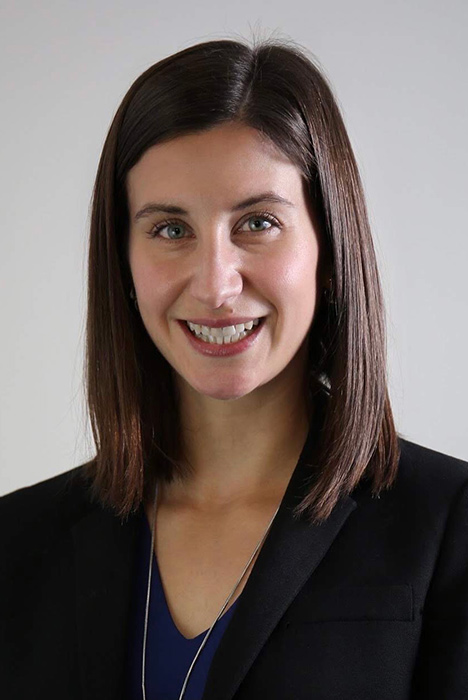Strengthening Global Health Through Policy
With the Global Health Advocacy Incubator, Kyra Berasi ('15) influences the health and well-being of communities on a global scale.

Photo by Fernanda Marin via Unsplash
Strengthening Global Health Through Policy
With the Global Health Advocacy Incubator, Kyra Berasi (’15) influences the health and well-being of communities on a global scale.
Amidst a global health emergency, Kyra Berasi (’15) is well aware of the impact that smart, inclusive, and forward-thinking advocacy can have on tackling big issues.

A legal advisor at the Global Health Advocacy Incubator since 2018, Berasi has a unique opportunity to influence the health and well-being of communities on a global scale. The incubator works with on-the-ground advocates and partners in 25 countries to build locally driven policy campaigns to further public health initiatives and regulations. This includes conducting research, crafting legislation and policy, negotiating grant assistance, supporting local advocacy efforts, and challenging opposition working against the public good.
“You need a host of policies to be in place to really allow people, families, and communities to thrive,” Berasi says. “The goal is to help local advocates pass policies that can save lives.”
The incubator’s work is especially critical during the COVID-19 pandemic, which has created new challenges to working with its partners. Governments have turned their full attention to responding to the pandemic, creating competing priorities for health advocacy issues. While a challenge, the incubator’s work on building connections with local advocates and helping them push for better health policy is a key approach to effectuating change.
“There’s a lot of coordination to be done, but I think we also have power in being so locally driven in all of our work,” says Berasi. “We have such close relationships with our partners that they can tell us what the priorities are in their countries at that time.”
Berasi traces her interest in policy from two formative experiences after graduating from George Washington University: An internship reviewing college student safety policies with an eye toward ending sexual violence on campuses, and a year spent teaching in Vietnam. When teaching abroad, Berasi enjoyed the dynamic collaboration she had with the students and other teachers, the exchange of ideas, and the cultural shift. When she began at Boston University School of Law, she put her focus into policy. After graduating in 2015, Berasi received a BU Law Public Service Fellowship, funding her work in public service at the Center for Reproductive Rights in Washington, DC. The position allowed her to work on federal policy and advocacy for women’s health and reproductive rights issues, an area she is passionate about. The experience also showed her how interrelated women’s health issues are with other public health topics, and inspired her to broaden her focus with other global health issues.
“[The fellowship] was really instrumental for putting me on the path I’m on now,” she says. “It was a platform that allowed me to expand in terms of having a greater sense of what I wanted to do next in my career, while also getting to know different advocates, see the work they do, and understand the challenges they face.”
Not having access to healthy food can be a risk factor for different non-communicable diseases, which can impact a person’s ability to fight off pathogens. If we want to create stronger health systems that can better respond to communicable diseases like COVID-19, then we have to look at issues like access to healthy food.
One element Berasi has noticed in her work is how intertwined health issues are. The COVID-19 pandemic isn’t happening in a vacuum, and the health concerns raised by the crisis stem from and are exacerbated by issues she works to combat every day, such as the lack of access to healthy food in many communities.
“Not having access to healthy food can be a risk factor for different non-communicable diseases, which can impact a person’s ability to fight off pathogens,” says Berasi. “If we want to create stronger health systems that can better respond to communicable diseases like COVID-19, then we have to look at issues like access to healthy food.”
One example she is focused on is eliminating trans fats in foods, which can increase the risk of heart disease. While regulated in the United States and a growing number of other high-income countries, trans fats are still prevalent in food marketed to middle and lower-income nations, reflecting large companies that are looking to offload potentially harmful products or sell them cheaply for profit. A recent success has been in Turkey, where the incubator’s work with local advocates and Turkish health organizations led to the government regulating trans fats last May.
“Having local advocates leading the way makes all the difference in the world,” adds Berasi. “It’s really about having those close ties and making links between issues.”
Looking forward to 2021, Berasi says that the incubator is pushing for more descriptive and easy-to-understand food labelling (following a notable model Chile has adopted), addressing unhealthy food advertising, working to build healthier school environments, promoting sodium reduction, and increasing hypertension control. She notes that the incubator is looking at momentum in the Caribbean and Latin America, which may provide models for food labelling and healthy school environments that could prove adaptable for other countries. The incubator is also continuing to work on trans fats regulation, noting progress in Nigeria and India.
Every step of the way, Berasi adds, the incubator is continuing to work alongside their partners and advocates, helping them to continue making progress through the pandemic.
“If we are able to target powerful corporate actors with regulations and find innovative ways to share knowledge among public health advocates across the world, then we can tip the power back to the people and make it so that they have the ability to live healthier lives.”
